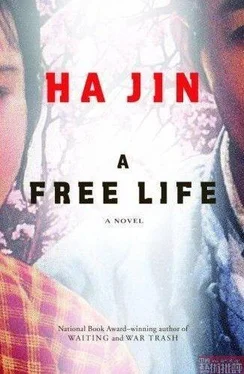Nan pretended he hadn't heard them. However, the moment he rounded the corner of the first building, Uncle Zhao appeared, holding a galvanized kettle. The mousy old man, pock-faced and beetle-browed, froze midstride, then approached Nan, saying, "Big nephew, you don't remember me? No? You have such a short memory."
Nan recognized him, but also remembered his father's admonition to avoid this old codger. He forced a smile, his face blushing blotchily. "Of course I know you, Uncle Zhao. How are you?"
"I'm good. When did you come back? Why didn't your father breathe a word?" He looked upset, a frown gathering on his bulging forehead.
"I didn't tell him about my return either. I'm on a business trip and dropped in to see my parents." " Have you been home for days?"
"No, I arrived yesterday." Nan had to lie to exonerate his father. "Uncle Zhao, I've got to go. My mother's waiting for me."
"I understand." Despite saying that, the old man looked sour, his face a little crumpled as if Nan had slighted him.
Uncle Zhao phoned early that afternoon to invite Nan and his father over for dinner the next evening. Nan's father kept thanking him while apologizing for Nan 's inability to come. He said, "He's leaving tomorrow morning. He didn't plan to come home. He just took a break from his business engagement in Beijing…No, this evening is out of the question. We're going to Peacock Pavilion for a family gathering. Nan hasn't seen his nephew and niece yet.…You see, he's really in a hurry… Ahem, why did you say that? Of course he's grateful. Only because he doesn't have time to see anybody here. Listen, Old Zhao, he brought back something for you. I won't tell you what it is now…Don't work up your temper like this, all right?… I'll see you soon." He hung up.
Nan was uneasy about his father's promise to Uncle Zhao and said, "What are you going to give him?"
" That will be up to you. How much do you want to spend?" His father grinned, a tea leaf on his eyetooth.
"I don't have time to get anything for him."
"No problem. You can leave some money with me, and I'll buy a gift for him and say you brought it back."
"But he'll be able to tell it's a hoax."
"Don't worry about that. Give me two hundred dollars."
"For what?"
"I can buy a small air conditioner for him. It isn't much, really. You owe him-he gave you four of his best paintings. Any one of them could be worth that amount. This is cheaper than to arrange his visit to America, isn't it? He always dreams of holding a one-man show there."
"All right, all right."
Nan took out his billfold and gave his father four fifties. He felt this was a good arrangement, since he'd have to repay the debt to Uncle Zhao one way or another. If he had gone to the old man's home for dinner, he was sure that the geezer would have tried every way to make him promise to help arrange a show of his paintings and calligraphy in New York, or D.C., or Atlanta. He was afraid of meeting that monomaniac again.
AFTER a series of loud hisses, the train bound for Beijing thumped, threw Nan forward a bit, then began pulling out of the Harbin station. He waved good-bye to his parents and siblings on the platform. His mother and sister broke into tears while his eyes filled too. He felt he might never be back again.
He was seated in a sleeper compartment and rested his cheek against the frame of the window. Outside, the grassland slid by. The convex plain stretched into a mist wavering in the distance. Along the railroad track a low fog was gathering, so thick that the nearby fields seemed covered by a layer of fresh snow. A moment later a swarm of town houses emerged, surrounded by vegetable fields in which women and old men were squatting on their haunches, tending seedlings or spreading manure with bare hands. Nan could tell that the ceramic-tiled houses, before which were parked some cars of Japanese and German makes, were inhabited mostly by rich people. Satellite dishes stuck out of the roofs like huge mushrooms. If he had moved back to this city, he could have afforded to live in such a place, but he'd have felt uncomfortable about the sight of the poor peasants who toiled in the fields in the same way as their ancestors had done centuries before. It seemed that the harder they worked, the poorer these people would get.
Villages and hamlets came up and flitted away. They hadn't changed, and some showed little life in them except for a few columns of cooking smoke rising from the thatched roofs. In front of a schoolhouse a bunch of children chased a soccer ball, all wearing nothing above the waist. Nan guessed that perhaps most of the able hands in the villages had left to seek work in towns and cities.
Indeed, many of the fields looked disused, as if the people had abandoned the land, whose dark soil is so rich that the plain is known as China 's "granary."
In the same compartment sat two other passengers, a bulky old woman and a trim salesman. They were chatting about bureaucratic corruption while smoking a pack of Red Pagoda Hill cigarettes. The heavy-faced woman, who must once have been a ranking official, kept saying she missed the leadership of Chairman Mao, who had been not only concerned about common people's livelihood but also cleaner than any of the current national leaders. Her words put Nan in mind of the memoir by Mao's personal doctor published in the United States recently, which debunked the myth of the great man's integrity and honesty. Evidently these people here didn't have access to a book like that. They had no idea of the huge royalties Mao had reaped from his own books, particularly the little red one, during the time when in the whole country no one else received royalties and all writers had been paid merely small contribution fees. Neither did they know that the great leader had bedded women like changing clothes.
The squint-eyed salesman sighed and said one of his cousins' families was so impoverished that they hadn't been able to send their son, whose stomach was perforated by an ulcer, to the hospital and instead had hired a sorcerer to chant and dance around to exorcise the evil spirit said to have possessed the boy. As a consequence, they'd lost their only son. But in their local county many officials had used public funds to build houses for themselves, some even for their mistresses, and one bureaucrat had constructed a mansion for his grandchild, who wasn't even conceived yet.
The woman sighed and told the man, "I've seen so many poor people these days that I often wonder why we Communists started the revolution in the first place. My maid's brother in the countryside named his little daughter 'Color TV,' because he and his wife always dream of having a television set."
Reluctant to join them in their conversation, Nan climbed to the top berth and lay down to doze off despite the clip-clop-clip-clop drumming of the wheels. To some extent, he regretted having come back to see his parents and siblings, who seemed more distant from him than ever before. He wondered why so many overseas Chinese would retire to this mad country where you had to bribe and feast others to get anything done. Clearly a person like him wouldn't be able to survive here. Now he wanted all the more to live and die in America. How he missed his home in Georgia.
DANNING told Nan that Shaoya, Mrs. Liu, whose husband had passed away five weeks before, wanted to see him. Nan had liked Mr. Liu, though he didn't share his nationalistic zeal. He had always felt that the old man was partly blinded by his patriotism. Danning called a cab and together the two of them set out for the Lius'. Although the distance was less than three miles, it took them almost forty minutes to get there. The streets were jammed with traffic-automobiles, bicycles, tricycles, and even a few horse carts. Nan wondered why so many people wanted to buy cars in Beijing. He had seen a row of Cadillacs and BMWs parked before a multistory apartment building. Beyond doubt, some of the families had put more money into their vehicles than into their housing.
Читать дальше












